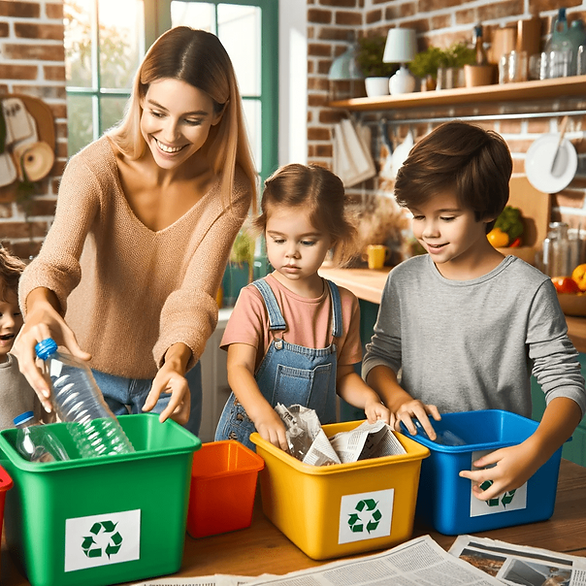
I’m going to show how your family can be committed to recycling, you know, making sure we’re doing our part for the environment, but in a way that doesn’t turn our already busy lives upside down. Let’s get real about how we can make recycling a no-brainer in our homes.
1. Starting Small: When you’re introducing recycling to your family, think about easing into it. You might start by focusing on just one or two items that are super common in your household waste, like plastic milk jugs or newspapers. Place a small bin next to your regular trash can for these items. This way, it’s not overwhelming, and you can gradually introduce more recyclable materials once everyone’s used to the idea. Remember, small changes can lead to big impacts over time.
2. Make it a Game: Kids love games, and turning recycling into a fun activity can really boost their interest. For instance, you could create a weekly chart where kids get stickers for each day they recycle properly. Or have a monthly challenge to see who can come up with the most creative use for a recyclable item. The key is to make it engaging and a little competitive, but in a fun, light-hearted way.
3. Have a Chat: Sit down with your family and have a simple, straightforward conversation about why recycling matters. You don’t need to get too scientific or complex. Focus on easy-to-understand concepts like how recycling helps reduce waste in landfills, saves trees, or protects wildlife. You can even share stories or facts about the positive impact recycling has on the environment to make it more relatable and real for them.
4. Set Up a Recycling Station: Designate a specific spot in your home for recycling. This could be a corner in your kitchen or by the back door. Use different bins or boxes for different materials – one for paper, one for plastic, and so on. To make it even easier, especially for younger kids, use color-coded bins or stick pictures on each bin (like a bottle on the plastic bin, a newspaper on the paper bin). This visual aid can help everyone remember what goes where.
5. Lead by Example: Children are great imitators. So, make sure they see you recycling consistently. Let them see you rinse out jars and cans, break down cardboard boxes, and take the recycling bin to the curb. Your actions speak louder than words, and when kids see you making an effort, they’re more likely to follow suit.
6. Get Creative: This is where you can really have some fun with recycling. Turn it into a crafty activity. For example, use old magazines for collage art projects, transform egg cartons into paint holders, or make bird feeders from plastic bottles. These activities not only teach kids about reusing and recycling, but they also spark creativity and can be a great way for the family to spend quality time together.
7. Keep Learning: The world of recycling is always evolving, with new materials becoming recyclable and new methods being developed. Stay curious and informed about recycling. Share interesting facts or news about recycling with your family during dinner or while driving them to school. This keeps the topic fresh and interesting, and it shows your kids that learning is a lifelong journey.
By expanding on these ideas, you can create a recycling routine that’s not only effective but also enjoyable for the whole family. It’s all about making small, sustainable changes and finding the joy in taking care of our planet together.
Discussing the impact of recycling in specific numbers can really put things into perspective, especially when you’re trying to motivate your family to participate. Let’s look at some key figures that highlight the significant impact recycling can have:
- Saving Trees: For every ton of paper recycled, we can save about 17 trees. Think about that in terms of your family’s paper usage, like newspapers, magazines, and school papers. If your household recycles all its paper for a year, you contribute to the conservation of a small forest!
- Energy Conservation: Recycling aluminum cans saves up to 95% of the energy needed to make new cans from raw materials. In fact, recycling just one aluminum can saves enough energy to run a TV for three hours. If your family recycles all its aluminum cans, the energy saved could be substantial.
- Reducing Greenhouse Gas Emissions: Recycling helps reduce greenhouse gas emissions associated with manufacturing new products. For example, recycling one ton of plastic bottles saves approximately 3.8 barrels of oil. Over time, the cumulative effect of a neighborhood or community focusing on recycling plastics can be equivalent to taking several cars off the road.
- Water Conservation: The process of recycling paper uses about 60% less water compared to making new paper from trees. Considering the vast amount of water required for paper production, your family’s effort to recycle paper contributes significantly to water conservation.
- Landfill Space: Recycling helps reduce the amount of waste sent to landfills. For example, every ton of recycled office paper saves roughly 3.3 cubic yards of landfill space. By recycling consistently, your family can play a part in preserving land space and reducing environmental pollution.
- Resource Preservation: It’s estimated that recycling one glass bottle saves enough energy to power a 100-watt bulb for four hours. Glass is 100% recyclable and can be recycled endlessly without loss in quality or purity. Your family’s effort to recycle glass bottles and jars contributes to saving natural resources like sand.
- Economic Impact: Recycling and reuse activities in the United States account for numerous jobs. By supporting recycling, you’re also supporting an industry that provides employment to thousands of people.
When you share these numbers with your family, it helps them visualize the tangible impact of their recycling efforts. It’s not just about reducing waste; it’s about making a positive impact on the environment, conserving resources, and contributing to a healthier planet. This can be a great motivation for everyone in the family to stay committed to recycling.
Family recycling is more than just a household chore; it’s a powerful way for families to positively impact the environment. Simple steps like starting small, turning recycling into a fun game, and being creative with recyclables can make a huge difference. By having open conversations about the importance of recycling and leading by example, parents can instill lifelong habits in their children. It’s about making a conscious effort every day to care for our planet, and in doing so, families can inspire others in their community to join the movement. Together, small actions at home can lead to significant changes for a healthier, more sustainable world.



